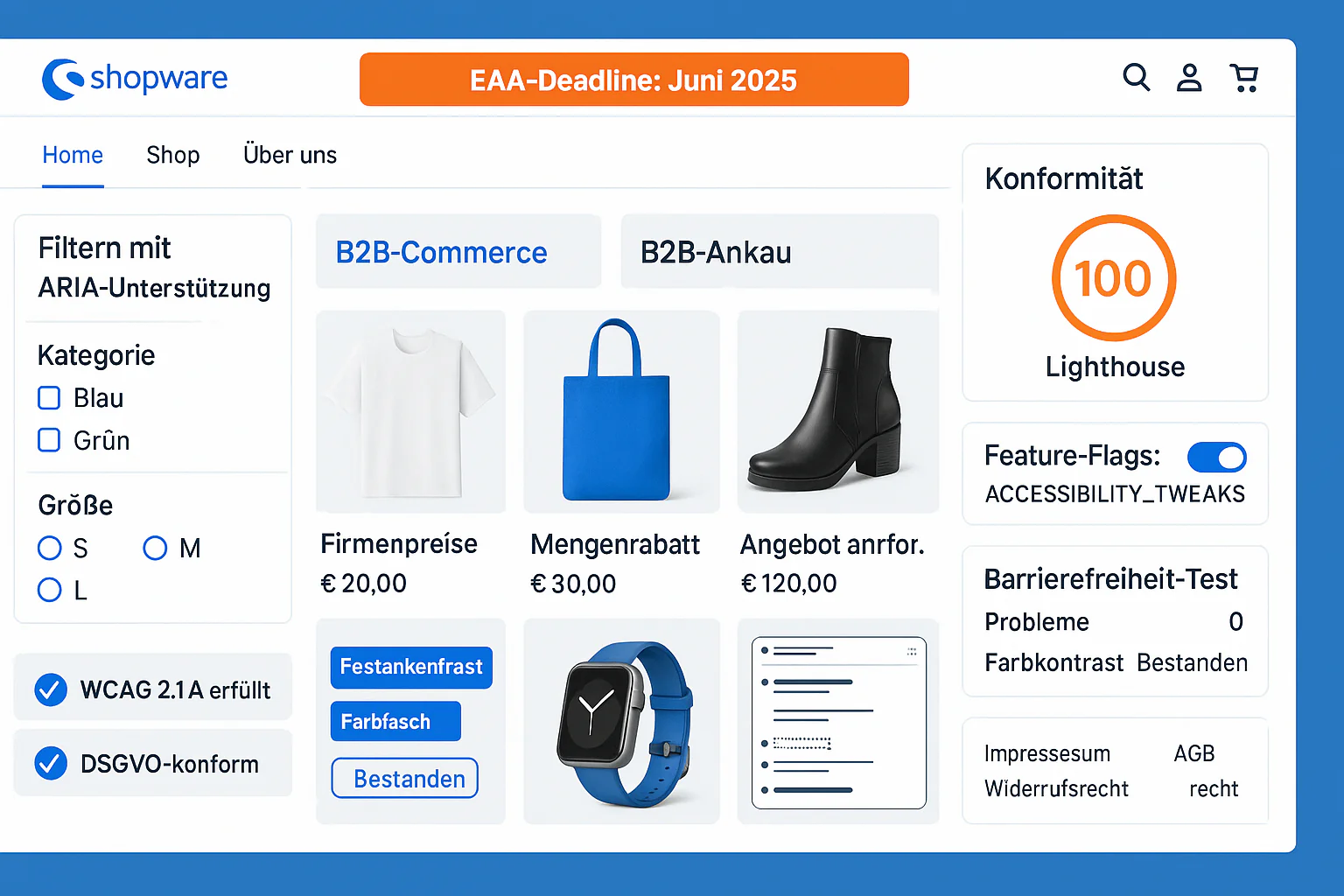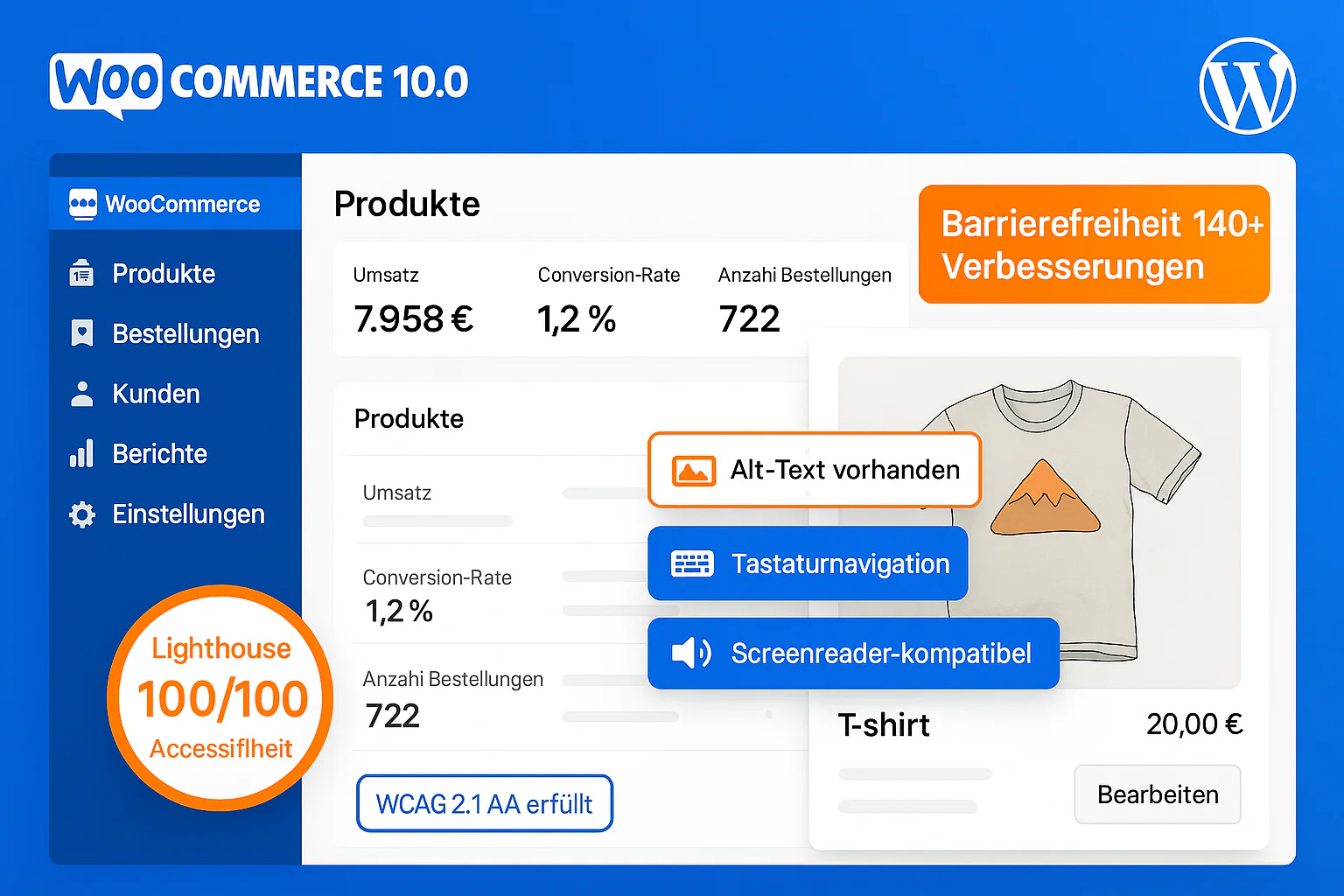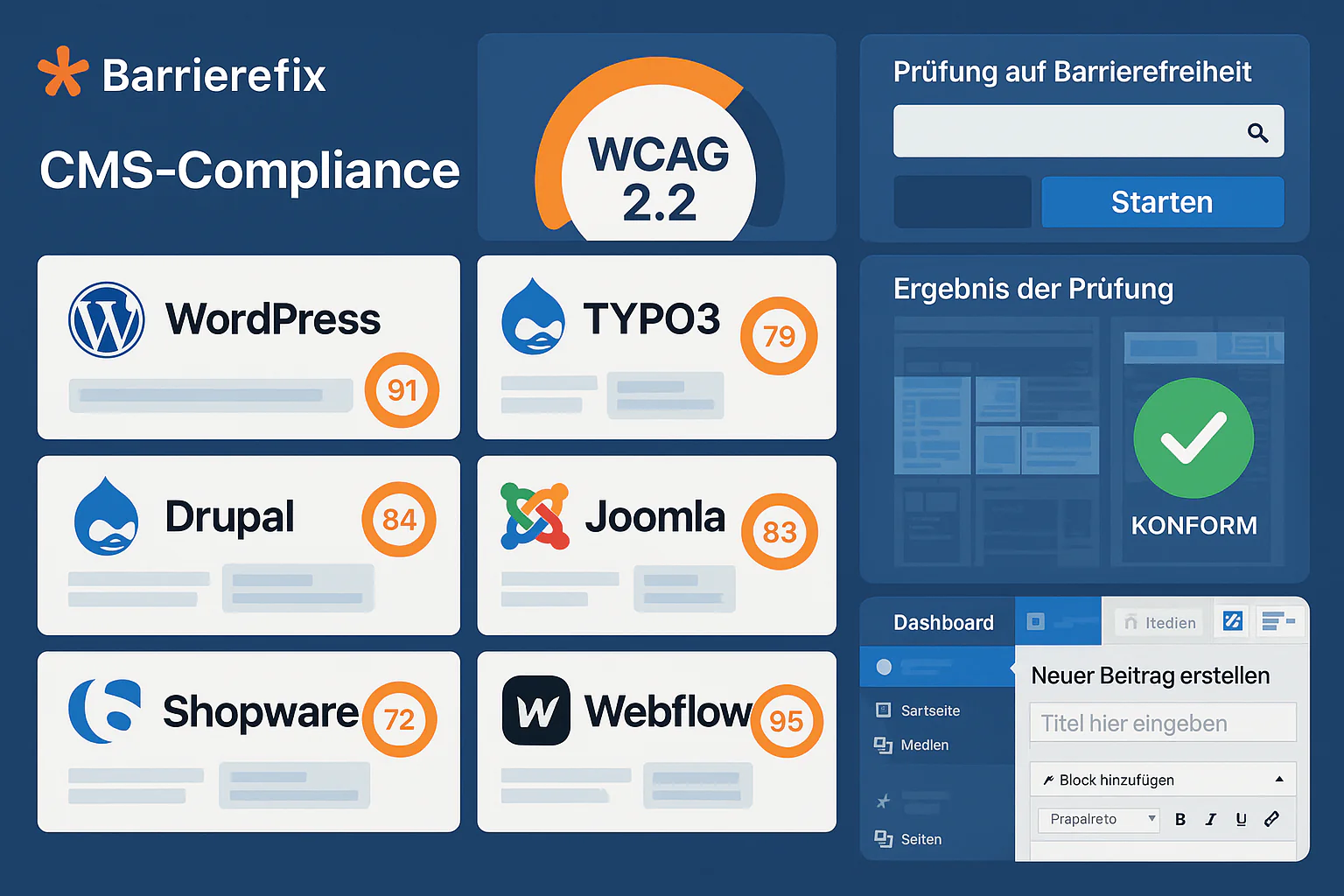Shopware 6 Barrierefreiheit: EAA Compliance Guide für E-Commerce

Shopware e-commerce accessibility research report
Comprehensive accessibility comparison reveals strategic platform differences
Shopware has emerged as a leader in e-commerce accessibility with its systematic approach to WCAG 2.1 AA compliance, particularly targeting the European Accessibility Act's June 2025 deadline. The platform's commitment to built-in accessibility features distinguishes it from competitors like WooCommerce, which relies more heavily on its plugin ecosystem for accessibility enhancements. Recent updates in Shopware 6.6+ demonstrate a proactive strategy, implementing accessibility improvements through feature flags before making them mandatory in version 6.7.
The comparison with WooCommerce reveals fundamental architectural differences. While WooCommerce benefits from over 140 accessibility enhancements delivered in 2024 and claims substantial WCAG 2.2 AA/AAA conformance, it depends significantly on theme selection and third-party plugins for full compliance. Shopware, conversely, builds accessibility directly into its core platform, achieving a perfect 100/100 Google Lighthouse accessibility score through automated testing with AXE core and Playwright. This built-in approach provides more consistent accessibility across installations, though WooCommerce's extensive plugin ecosystem offers greater customization flexibility.
Kostenlose Beratung sichern
Lassen Sie uns über Ihre Website-Barrierefreiheit sprechen
Jetzt Termin vereinbarenProduct filtering revolutionizes accessible shopping experiences
Shopware's product filtering implementation represents a sophisticated approach to accessible e-commerce navigation. The ACCESSIBILITY_TWEAKS feature flag enables comprehensive ARIA implementations including live regions for dynamic content updates, proper focus management, and semantic HTML structures. All filter components now include dedicated ariaLabel parameters, ensuring screen reader users receive contextual information about filter purposes and states.
<!-- Example filter implementation with ARIA support -->
{% sw_include '@Storefront/storefront/component/listing/filter/filter-range.html.twig' with {
sidebar: sidebar,
name: 'price',
minKey: 'min-price',
maxKey: 'max-price',
displayName: 'listing.filterPriceDisplayName'|trans|sw_sanitize,
ariaLabel: 'listing.filterByPriceAriaLabel'|trans|sw_sanitize
} %}
The JavaScript plugin architecture extends PluginBaseClass to provide consistent accessibility features across all filter types. The platform's window.focusHandler manages focus states during modal and offcanvas interactions, ensuring keyboard users maintain context during filter operations. Multi-select filters use proper list semantics with role attributes, while range filters include comprehensive error handling with descriptive messages for screen reader users. The implementation surpasses basic compliance by providing polite ARIA announcements for filter result changes, making the dynamic shopping experience fully accessible.
Vergleichen Sie Shopware mit WordPress WooCommerce Barrierefreiheit in unserem detaillierten Guide.
Navigation architecture sets new accessibility standards
Shopware 6's navigation system demonstrates mature accessibility implementation through semantic HTML5 elements, comprehensive Schema.org markup, and sophisticated keyboard navigation patterns. The platform addresses the critical mega menu accessibility challenge—previously problematic in issue #3610—with complete keyboard support including TAB navigation, Enter key activation, and ESC key closing functionality.
The breadcrumb implementation combines JSON-LD structured data with proper ARIA labeling, while new Twig functions like sw_breadcrumb_full() and sw_breadcrumb_full_by_id() (v6.6.10.0+) provide developers with flexible accessibility-preserving tools. Mobile navigation receives equal attention, with proper button elements replacing div-based toggles, aria-expanded attributes for state communication, and focus trapping within mobile menus. The skip navigation implementation allows users to bypass repetitive navigation elements, directly accessing main content—a crucial feature for screen reader users that demonstrates Shopware's commitment to efficient user experiences.
Kostenlose Beratung sichern
Lassen Sie uns über Ihre Website-Barrierefreiheit sprechen
Jetzt Termin vereinbarenPWA accessibility bridges mobile and desktop experiences
Shopware's evolution from the legacy PWA to Shopware Composable Frontends marks a significant accessibility advancement. Built on Vue.js 3, Nuxt.js 3, and TypeScript, the current solution implements mobile-first accessibility with careful attention to touch target sizing. Following enhanced recommendations of 48x48px (exceeding WCAG's 44x44px minimum), the platform ensures comfortable interaction for users with motor impairments.
// Service worker maintaining offline accessibility
const CACHE_NAME = `shopware-pwa-v${CACHE_VERSION}`;
self.addEventListener('install', (event) => {
event.waitUntil(
caches.open(CACHE_NAME).then((cache) => {
return cache.addAll([
'/',
'/offline.html',
'/css/accessibility.css',
'/js/accessibility.js'
]);
})
);
});
The PWA implementation provides comprehensive offline accessibility through service workers that cache essential accessibility resources, custom offline pages that maintain brand consistency, and background sync for cart persistence. Progressive enhancement ensures core functionality remains available without JavaScript, while server-side rendering improves initial page load for screen readers. Gesture-based interactions include single-point alternatives for all multi-point gestures, meeting WCAG 2.5.1 requirements and ensuring users aren't excluded based on their interaction capabilities.
Erfahren Sie mehr über die EAA 2025 Deadline und Compliance-Anforderungen für E-Commerce Plattformen.
B2B features demonstrate enterprise-grade accessibility
Shopware's B2B commerce capabilities showcase accessibility at scale through features like the Quick Order function (available since v6.5.4.0), which provides table-based interfaces supporting keyboard navigation, screen reader compatibility through proper ARIA labels, and CSV upload functionality with accessible drag-and-drop alternatives. The platform handles complex pricing structures through semantic tables with proper headers, screen reader-friendly price announcements, and detailed breakdowns of taxes and fees.
Customer-specific catalog navigation implements hierarchical organizational structures with semantic HTML, ARIA landmarks for navigation areas, and clear error messaging for restricted access. The quote management system includes comprehensive form labeling, status announcements for screen readers, and progress indicators for quote processing. Multi-user account management features accessible permission matrices and role descriptions, while order history provides properly structured tables with sortable columns featuring ARIA sort indicators. These B2B implementations prove that complex enterprise features can maintain full accessibility without compromising functionality.
German and EU compliance drives comprehensive implementation
Shopware's approach to regulatory compliance positions it as a leader in meeting the European Accessibility Act (EAA) and German BITV 2.0 requirements. With mandatory compliance deadline of June 28, 2025, the platform has committed to full WCAG 2.1 AA and BITV 2.0 compliance across its Storefront. The implementation goes beyond basic WCAG requirements to include German-specific needs like accessibility declarations in machine-readable format, Impressum and Datenschutzerklärung accessibility, and support for the upcoming EN 301 549 v4.1.1 standard.
The platform provides comprehensive compliance tools including automated testing with AXE core and Playwright, Google Lighthouse integration achieving perfect accessibility scores, and dedicated GitHub issue tracking with accessibility labels. For merchants, Shopware offers accessibility statement generation tools, built-in GDPR compliance features, and third-party extensions supporting BITV and EAA EN 301 549. The penalty structure—with fines up to €100,000 for serious violations—underscores the importance of Shopware's proactive approach. Market surveillance authorities can order service discontinuation, while civil enforcement through competitor lawsuits creates additional compliance pressure.
Verstehen Sie die BFSG Bußgelder bis €100.000 und wie Sie diese vermeiden können.
Kostenlose Beratung sichern
Lassen Sie uns über Ihre Website-Barrierefreiheit sprechen
Jetzt Termin vereinbarenPlugin ecosystem enables extensible accessibility
The Shopware Store offers numerous accessibility-focused plugins, with market leaders like "Barrierefrei Hilfswerkzeuge" (1200+ downloads) and Eye-Able® Assist providing features from text scaling to AI-powered image alt-text generation. Starting June 28, 2025, all new extensions with user-facing frontends must comply with accessibility standards, including Lighthouse A/B testing, mandatory title tags for links, alt attributes for images, and prohibition of inline CSS.
// Plugin accessibility implementation example
class AccessibilityPlugin extends Plugin {
public static function getSubscribedEvents() {
return [
'storefront.rendered' => 'onStorefrontRendered'
];
}
public function onStorefrontRendered($event) {
// Inject accessibility improvements
}
}
The development framework provides extensive API support through Symfony-based architecture, over 1500 template extension points, and the JavaScript plugin system with built-in focus management. Testing integration through Cypress + Axe enables automated accessibility validation, while theme inheritance ensures accessibility features cascade properly through customizations. Documentation requirements mandate bilingual support (English/German), clear accessibility setup instructions, and inclusion of uncompiled JavaScript for transparency.
Performance optimization maintains accessibility excellence
Shopware successfully balances high-performance requirements with accessibility through sophisticated optimization strategies. The platform's JavaScript bundle optimization evolved from a monolithic 600KB bundle to asynchronous loading with the defer attribute, eliminating render-blocking while maintaining screen reader compatibility. Lazy loading implementations preserve alt text and ARIA attributes while achieving up to 80% image payload reduction through CDN integration.
The ACCESSIBILITY_TWEAKS feature flag enables breaking changes that improve both performance and accessibility, including conversion to semantic list structures, enhanced focus states, and improved keyboard navigation. Critical CSS optimizations update the base font-size to 1rem (16px) for better readability while maintaining WCAG 2.1 AA color contrast standards. Recent improvements in Shopware 6.7.2 demonstrate this balance: OpenSearch optimization achieved 33-200% performance improvements in large catalogs, DOM nodes reduced from 10,269 to 3,020 while maintaining semantic structure, and Core Web Vitals improvements occurred alongside full WCAG 2.1 AA compliance maintenance.
Lernen Sie mehr über CMS-Barrierefreiheit für alle Systeme und beste Praktiken.
Fazit: Shopware als Führer für barrierefreien E-Commerce
Shopware's comprehensive accessibility implementation positions it as a leader in accessible e-commerce, particularly for European markets facing stringent regulatory requirements. The platform's built-in approach, combined with progressive enhancement through feature flags, provides merchants with a clear path to compliance while maintaining performance and functionality. With version 6.7 making accessibility features default and continuous improvements through minor releases, Shopware demonstrates that enterprise-grade e-commerce can be both powerful and inclusive. The platform's commitment to meeting the June 2025 EAA deadline, coupled with extensive developer tools and documentation, makes it an compelling choice for businesses prioritizing accessibility alongside performance and features.
Bereit für Shopware 6 EAA Compliance? Unsere E-Commerce-Experten implementieren vollständige Barrierefreiheits-Lösungen für Ihren Shopware Shop mit garantierter BFSG-Konformität.
Kostenlose Beratung sichern
Lassen Sie uns über Ihre Website-Barrierefreiheit sprechen
Jetzt Termin vereinbarenKostenloses Audit Ihrer Website
Lassen Sie uns Ihre Website auf Barrierefreiheit prüfen – kostenlos und unverbindlich
Themen:
CMS-ClusterVertiefen Sie Ihr Wissen
Weitere Artikel

WordPress Barrierefreie Produktseite: WooCommerce WCAG Guide
WooCommerce 10.0 WCAG 2.2 Compliance Guide 2025: Themes, Plugins, Checkout, Payment Gateways - 140+ Accessibility Features richtig konfigurieren.

Barrierefreiheit für alle CMS-Systeme: Der Praxis-Guide
Kompletter CMS-Barrierefreiheit-Vergleich 2025: WordPress, TYPO3, Drupal, Joomla, Contao. WCAG-Compliance, Kosten, Plugin-Ökosystem und BFSG-Readiness für deutsche Unternehmen.

Contao CMS BITV Compliance: German Market Leader
Contao CMS Accessibility Guide 2025: Native BITV 2.0 Compliance, German Extensions, Multi-Site Management - 175.000 Websites weltweit.